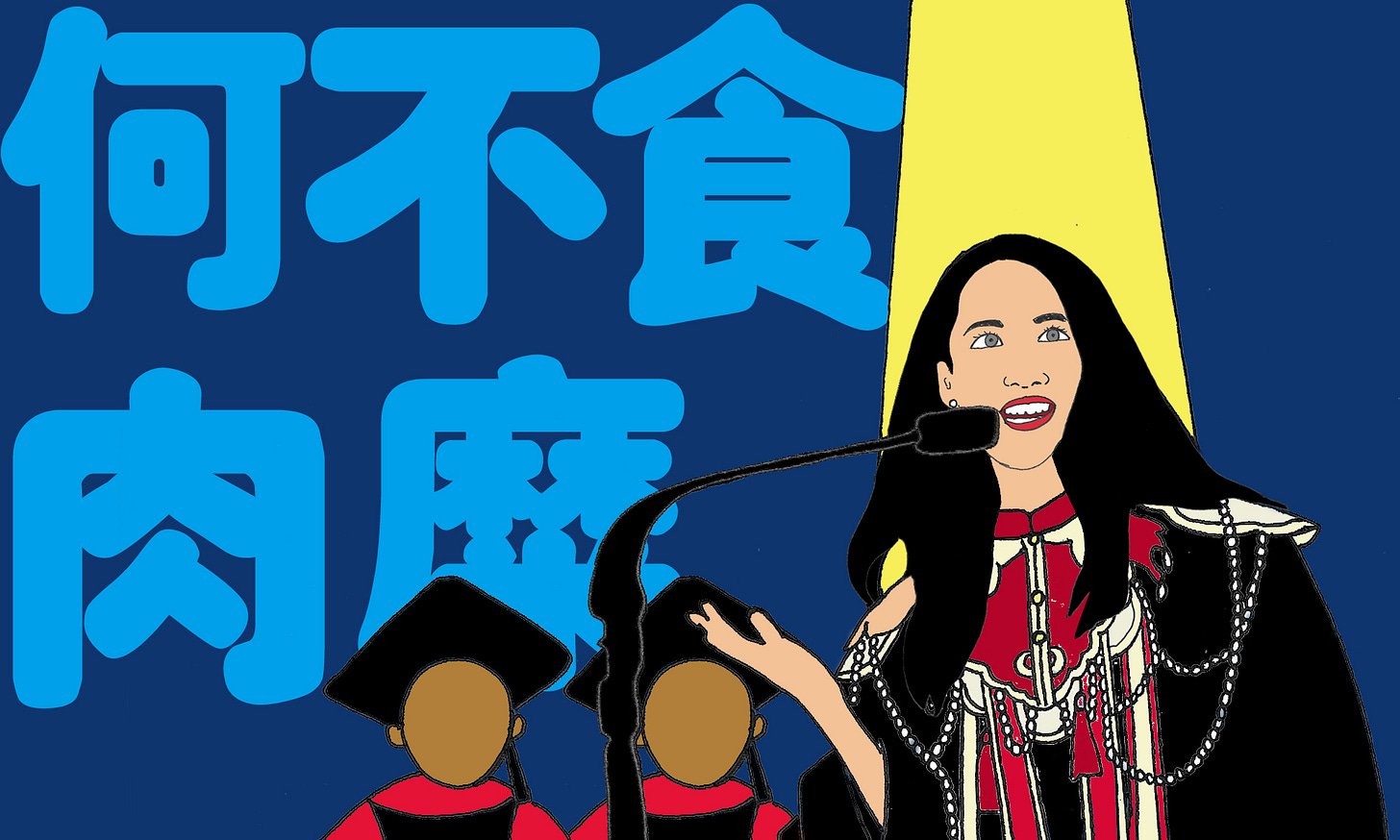"Let them eat cake" — Phrase of the Week
A four-minute Harvard graduation speech which has stirred up all kinds of controversy in China

Our phrase of the week is: "let them eat cake" (何不食肉糜 hé bù shí ròumí)
Context
A speech by a Chinese graduate at Harvard’s commencement ceremony has sparked a heated reaction in China.
Luanna Jiang Yurong (蒋雨融) was one of the three student speakers at Harvard’s graduation ceremony on May 29, and the first ever female speaker from China.
The 25-year-old from Qingdao delivered a four-minute speech titled “Protecting Our Humanity” (守护我们的人性) which celebrated internationalism and diversity.
It quickly went viral in China, and Jiang was initially praised by many for her global outlook, and as a “source of pride for China” (为国争光).
But praise quickly turned into scrutiny, leading to a backlash on social media which is still simmering in China more than two weeks on.
Her speech struck a nerve with many, touching on sensitive themes of unfairness and privilege in China, when it was revealed her father worked for a state-linked environmental foundation. This led to accusations that Jiang’s place at Harvard was secured through elite family connections.
Comparisons were drawn between Jiang Yurong, and two recent high profile scandals related to the privileged elite: a trainee doctor known as “Miss Dong” (董小姐), and seventeen-year-old actress, Huang Yang Tiantian (黄杨钿甜).
Critics also suggested the content of Jiang’s speech was out of touch, and far removed from the struggles of daily life in China.
So ironically her message of empathy and finding common ground further exposed the deep divide between normal people and the privileged in China:
What netizens find most repulsive isn’t just Jiang Yurong’s “let them eat cake” attitude.
Another crucial point is that the suffering of ordinary people has increasingly become a kind of trendy accessory for the elite to show off their virtue.
网友最反感的,也不仅仅是蒋雨融这种何不食肉糜的心态。还有很重要的一点是,我们越来越发现,普通人的苦难,已经成为了精英阶层自我标榜的时尚单品。
Wǎngyǒu zuì fǎngǎn de, yě bù jǐn jǐn shì Jiǎng Yǔróng zhè zhǒng hé bù shí ròumí de xīntài. Hái yǒu hěn zhòngyào de yì diǎn shì, wǒmen yuèláiyuè fāxiàn, pǔtōng rén de kǔnàn, yǐjīng chéngwéi le jīngyīng jiēcéng zìwǒ biāobǎng de shíshàng dānpǐn.
And with that, we have our Sinica Phrase of the Week.
What it means
“Let them eat cake” is a well-known colloquial phrase in Chinese. The literal translation is “Why don’t they eat meat porridge?” (何不食肉糜).
The phrase originates from the Book of Jin (晋书), compiled in the 7th century during the Tang dynasty by Fang Xuanling (房玄龄, 579–648), a renowned historian and chancellor of the Tang.
It appears in the chapter, Annals of Emperor Hui (惠帝纪):
When the Jin empire fell into chaos and the people were starving to death, the emperor asked: “Why don’t they eat meat porridge?” Such was his ignorance and delusion.
及天下荒乱,百姓饿死,帝曰:“何不食肉糜?”其蒙蔽皆此类也。
jí tiānxià huāngluàn, bǎixìng è sǐ, dì yuē: “Hé bù shí ròumí?” Qí méngbì jiē cǐ lèi yě.
Here the emperor is asking one of his aides about the plight of starving people during a famine. For him, meat porridge (肉糜) was part of his daily life of luxury and privilege. But it was a delicacy and totally unaffordable for ordinary people, who were starving in the streets.
In modern Chinese, the phrase is used to criticize politicians, or the rich and privileged, who are out of touch with reality and cannot relate to the daily struggles of ordinary people.
In English, it’s translated as “let them eat cake,” an idiom from the French, "Qu'ils mangent de la brioche", famously (though likely inaccurately) attributed to Marie Antoinette during the French Revolution.
In the context of Jiang Yurong’s Harvard speech, many of her critics in China saw it as yet another example of how the privileged elite enjoy opportunities that remain out of reach for the vast majority.
Andrew Methven is the author of RealTime Mandarin, a resource which helps you bridge the gap to real-world fluency in Mandarin, stay informed about China, and communicate with confidence—all through weekly immersion in real news. Subscribe for free here.
Read more about how this story is being discussed in the Chinese media in this week’s RealTime Mandarin.




Thanks for this great post! I love learning about cross-cultural similarities such a common saying to describe out of touch elite.